'Most Chinese of Voices' Singing Stories About China
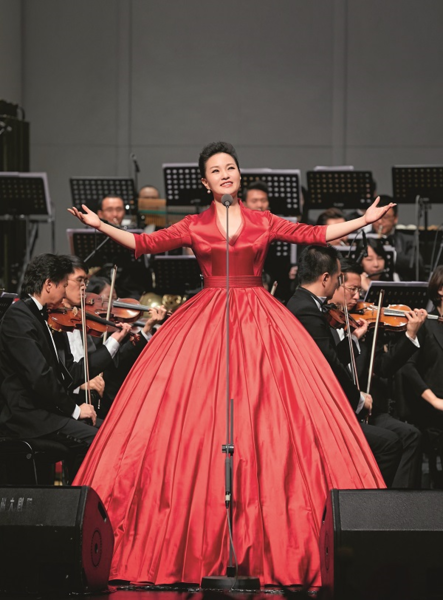 |
| Lei Jia |
Praised as the most quintessentially Chinese voice, soprano Lei Jia is well-known for her distinctive singing style, which combines Chinese folk music, bel canto and traditional Chinese opera. As a leading figure in Chinese opera, Lei has won prestigious national honors for performing arts, including the Wenhua Award and Plum Performance Award, and she has always explored creative methods to present the art of music.
Lei is a national, first-class performer and singer. She is also vice-president of the Chinese Musicians Association and member of the Standing Committee of the All-China Youth Federation.
Lei is a native of Yiyang, in Central China's Hunan Province. She developed an interest in singing when she was a little girl. After she graduated from Hunan Provincial Art School, Lei was admitted to China Conservatory of Music, in Beijing, in 1997. In 2010, she received her master's degree, in vocality, from People's Liberation Army (PLA) Academy of Arts, the predecessor of the College of Military Culture of the PLA National Defense University, in Beijing. In 2013, she enrolled in the China Conservatory of Music, in Beijing, and four years later she received a doctoral degree in folk vocal music art performance.
Her highly developed skills and performances have earned her numerous awards, including the Chinese Golden Bell Award for Music, the highest award in Chinese music, and the folk singing gold prize of the CCTV (China Central Television) National Young Singers TV Contest.
Lei has been invited to perform as a soloist at many significant occasions, such as the 2014 Asia-Pacific Economic Cooperation Evening Gala, and the 2016 G20 Hangzhou Summit Evening Gala. She has also appeared on international stages, where she has impressed audiences with her brilliant performances, and where she has given audiences a glimpse into China and Chinese culture. In 2015, she made her North America debut, with New York Philharmonic, at the Lincoln Center, in New York, the United States. She sang Chinese folk songs. After listening to her album, Dandelion Sky, Joshua Cheek, Chairman of the Grammy Awards jury, praised her as "the most Chinese of voices."
Inheriting Classic Opera
In November 2015, the new version of White-Haired Girl, first staged in 1945, debuted in Yan'an Liberation Theater, in Yan'an, in Northwest China's Shaanxi Province. Lei performed the lead role, Xi'er. Lei's vivid performance and skillful singing gave the audience an immersive audiovisual feast.
In September 2010, the original Chinese opera, Poems of Mulan, was staged at Mariinsky Theatre, in Saint Petersburg, Russia. Lei performed the lead role, Mulan. The sound of Chinese opera was heard for the first time in the theater, which had a history of more than 200 years.
Poems of Mulan featured the legendary story of Hua Mulan, who disguised herself as a man to join the army, taking the place of her ailing father. Mulan then achieved tremendous success in the army for her intelligence, and she rose through the ranks to become a general.
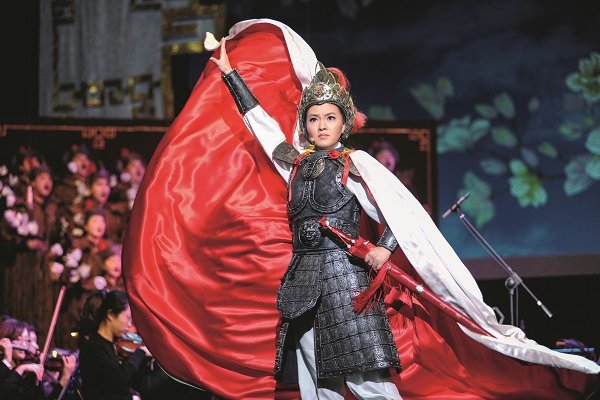 |
| Lei Jia performs in opera, Poems of Mulan. |
One of the most influential classic national operas, Daughter of the Party, reproduced by the National Center for the Performing Arts (NCPA), debuted on July 13. Lei performed the lead role, Tian Yumei, a primary-level Communist Party of China (CPC) member who devoted her life to protecting guerrilla soldiers during the Agrarian Revolutionary War (1927 -1937). Her superb performance won high praise from the media, and the audience.
The opera, adapted from the film of the same title, which premiered in 1958, was produced and set on stage in 1991, to celebrate the 70th anniversary of the founding of the CPC.
"It is great trust, and a great honor for me, to play the role of Tian Yumei on the stage of the NCPA this year, which marks the 100th anniversary of the founding of the CPC, and the 30th anniversary of the debut of the opera," Lei says.
One minute on stage requires 10 years practice off stage. Lei watched, and studied, both the 1958 film and the 1991 version of the opera, and she reflected on how she could best perform the role. She also participated in the whole process of reproducing the opera.
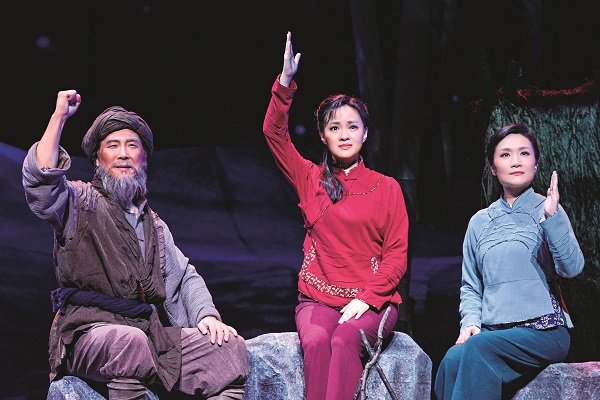 |
| Lei Jia (C) performs in opera, Daughter of the Party. |
"Opera is attractive to me. For singers, performing an opera is a test of their comprehensive capability. Chinese opera, which combines traditional Chinese art elements, is a unique contribution of Chinese composers to the art of opera, so it is more attractive," Lei says. She has performed in many other operas. For her, performing classic roles in Chinese operas is a way of inheriting traditional Chinese art.
Promoting Folk Culture
"Promoting folk music is my lifelong career," Lei says. She has long been an advocate of the new style of Chinese music, a style viewed as an expression of the essence of China, and she has interpreted this style via a wide range of artistic forms — and modern contexts. She hopes to bring vitality to traditional music and culture through new styles.
"The most important thing is that we should truly love and have confidence in the culture of our land. Only in this way can there be more inheritance and innovation (in music)," Lei says.
The album, Songs of the 56 Chinese Ethnic Groups, was released in Beijing in July 2008. Lei was featured on the album. She performed all 56 folk songs. To collect folk music of the 56 ethnic groups, Lei and the composers visited many remote mountainous areas in rural China.
Lei's singing skills are clearly evident on the album, as the 56 songs have different styles, and 10-plus songs are performed in different dialects of Chinese or in the languages of different ethnic groups.
The album was chosen by the Chinese Government to be presented as a national gift to the heads of state who attended the 2008 Beijing Olympic Games. In this sense, Lei says she fulfilled her desire to inherit traditional culture with songs, and to promote Chinese culture to the world through music.
Lei has a deep understanding of the artistic strength rooted in folk culture, and that has laid a solid foundation for her vocal music career.
Lei has performed Chinese operas, contemporary music and countless folk songs over the years. "I don't want to put too many rules on myself. Music itself doesn't have many boundaries. I hope there will be more, and better, ways to express the spiritual connotation of our folk music," she says.
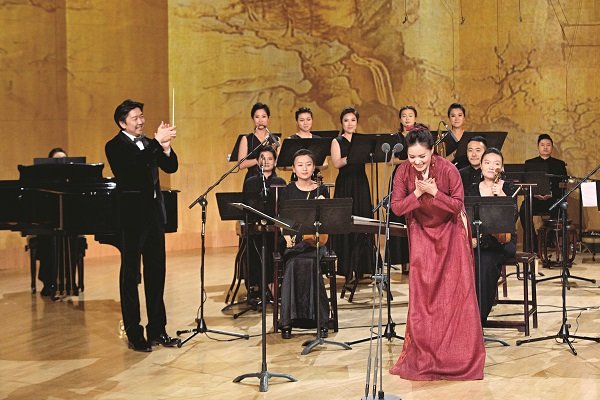 |
| Lei Jia's special concert of folk songs |
Cultivating Young Singers
"The biggest motivation … is passion for music. I have always retained my original passion and curiosity for music, especially Chinese vocal music. The art of music is a road without an end. Walking on this road, the most important thing is to keep learning and improving," Lei says.
As an accomplished soloist, who has a grateful heart, Lei has dedicated herself to cultivating young singers. She hopes young singers will strengthen their confidence, improve themselves and realize their music-related dreams.
In 2019, Lei launched the Shenzhen Singing Festival — National Young Singers Program, and she served as the program's art supervisor. The public-welfare program, with the purpose of cultivating young, talented singers, has been held for three sessions, and it has gained wide attention in the vocal-music industry. "I received great support and guidance as I grew up. Now, I want to establish a platform to create opportunities for more singers," Lei says.
The program accepts about 40 trainees during each session. The trainees generally make remarkable progress under the program, and they achieve excellent results in both domestic and foreign competitions. They also volunteer to teach music at schools in remote rural areas.
"I hope the program is not just a music activity, but that it can also form a cultural symbol and present a feast of music culture. I also hope more people, whether mentors, trainees or the public, will care about the cultivation of young talents, development of traditional culture and promotion of grassroots public-welfare undertakings," Lei says.
"As literary and art workers in the new era, we should bear in mind the spirit of the Party, love our family and homeland, and serve the people," Lei says.
Recording the great era with her music, Lei has made a unique contribution to promoting the development and prosperity of socialist culture. From performer to promoter of the public-welfare program, she has never stopped pursuing her artistic dream.
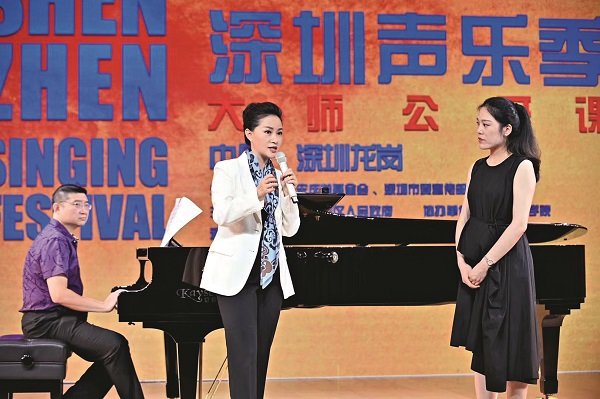 |
| Lei Jia (C) gives a lesson to young singers on the stage of Shenzhen Singing Festival — National Young Singers Program. |
Photos Supplied by Lei Jia
(Women of China English Monthly October 2021 issue)
Please understand that womenofchina.cn,a non-profit, information-communication website, cannot reach every writer before using articles and images. For copyright issues, please contact us by emailing: website@womenofchina.cn. The articles published and opinions expressed on this website represent the opinions of writers and are not necessarily shared by womenofchina.cn.


 京公网安备 11010102004314号
京公网安备 11010102004314号